Brendan Fraser Inkheart Interview
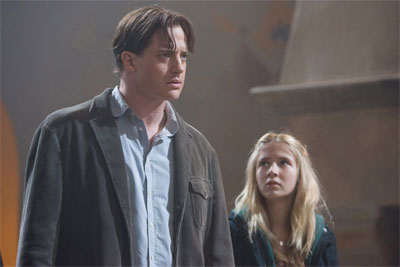
BRENDAN FRASER CONTINUES ON FANTASTIC JOURNEY
EXCLUSIVE Brendan Fraser, Inkheart Interview by Paul FischerIt's been quite the fantastic year for Brendan Fraser, from another Mummy movie to journeying to the centre of the earth and now as a father whose reading of literary works brings characters to life in Inkheart. And it seems as though the very boyish actor loves to work on these fantasies as he explained to Paul Fischer in this exclusive interview.
QUESTION: God, you've been a busy lad.
BRENDAN FRASER: When it rains, it pours. I've been actually able to space these things out.
QUESTION: You've had this one year in which three fantasy movies, essentially, have come out and I'm wondering, is it the kid in you that appeals to that genre? I mean, why do you go back to these kinds of films all the time?
BRENDAN FRASER: They have immense appeal.
QUESTION: To you?
BRENDAN FRASER: Yes, to me. And also, to the world at large. I mean, look. I've got kids. I'd love to be able to know that there's movies out there - that changes you. It just changes you. That there are films out there that I feel okay about taking `em to. And I don't necessarily want to sugar coat things for them. I think you owe it to ease them into things, given that everything's - even from when I was a kid, confronts you so readily. I like the idea of being able to share an experience that transcends just going to the movies. So I did The Journey to the Center of the Earth, right? It's great because - you know, it was an okay script. Our screen adaptation, you know, it was a little clunky, but we got through it. It's about three misfits who fall in a hole, go on a predicament of an adventure, and they get out. But it's in fantastic technology. It's brilliant, it's great. And it hadn't been done before. And it's an indication of where the industry is headed, and that's interesting for all sorts of like - you know, people get dollar signs in their eyes, and all that. Forget all that for a second. Look at it from the standpoint of, where were you when, with your son or your daughter? Or your grandkid? When you did something really great together. You'll remember it. You'll remember it.
One of my favorite things to do is - Eric and I, Eric Brevig, who directed that, we went around the country, we went to France, we went everywhere. We were like tubthumpers for this film, and these projections. Because no one at the studio that he was originally with - it just was not behind it. That doesn't matter. I don't want to get sidetracked by saying that. But the point is, what we loved to do was watch the audience watch the film. You'd see little kids reaching out, trying to grab the glow birds. You'd see their off-duty fireman Dad nearly jump out of his skin when the T-Rex showed up. But you see them loving the experience. The experience of being there. And they'll remember that in years to come. And that means something to me.
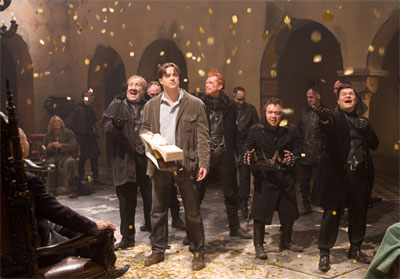 QUESTION: With this one, what struck me about this one, that I love any film that encourages kids to read. And I was wondering as a parent whether that aspect of this film was something that appealed to you.
QUESTION: With this one, what struck me about this one, that I love any film that encourages kids to read. And I was wondering as a parent whether that aspect of this film was something that appealed to you.BRENDAN FRASER: Well, this is a book that, without taking you can't kid a kid. I know that, just from not only having them, but just from kind of being a big one myself, but also because I know what appeals when you make films for them. You can't condescend. You just can't. Just don't, and go for it. Make sure you believe in it, so that they will. Now, Cornelia's novel, as I'd read or as she had even told me as we came to know each other - do you know how we began to know each other? She sent me a copy of the novel. "Dear Brendan. Thank you for inspiring this character."
QUESTION: Wow.
BRENDAN FRASER: Precisely. Flattered. "I hope you can read this aloud to your kids one day. Sincerely, Cornelia Funke." I thought my leg was getting pulled, or I was getting wound up. I just - "Who is it?" I didn't know who she was from a bar of soap, you know? And so I looked her up. And my goodness, she's prolific. She has a huge following. Translated into 37 languages? And she said that she'd written this book using-
QUESTION: Using you as the -
BRENDAN FRASER: As the touchstone for whatever that character was because he's a Silvertongue in the world of her imagination of this book. And when he reads aloud, things come to life, and vice versa. You know, you saw the movie. But, the book. Let's talk about it. Each chapter of that book, as I read it, is introduced by - I think this is fantastic - is introduced in a passage, a quote lifted from the greatest hits of literature from an obscure poem, an author who's contemporary. A lyric from a song and it thematically sets up what the chapter's about. But also, it stimulates the imagination in a way where you feel, "Wow. But that on the bucket list of what I should look for to read next." To hydrate your mind. If that's where you go. But it never, ever condescends, or does it in a way to have a young reader or their parent, who's reading aloud to them - and the jacket cover used to have, "Dare to read it aloud." The Chicken House publishers did that. Those are the ones out of the UK. It's Scholastic here in the US. And - because it's a book about reading aloud, and the power of the spoken word. It never wags its finger at its reader. It never says, "Take your vitamins and eat your vegetables." It never makes them feel as if they are being force-fed something. They're being treated to a fantasy world that's within the real world that we live in right now, that overlooks some of the technologies and rules and ways to solve problems that we just don't need to be a part of any more, to tell this story. Which is essentially about a family reuniting. And the heroine is a little girl called Meggie, who will one day - she doesn't know it yet - but one day, inherit the mantle of something quite incredible. That's why it's a trilogy.
QUESTION: Oh, really?
BRENDAN FRASER: Yes. There's Inkheart, Inkspell, and Inkdeath.
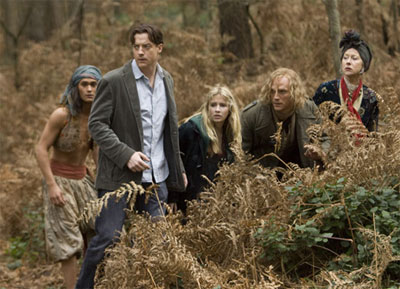 QUESTION: Will those ever be made into films?
QUESTION: Will those ever be made into films?BRENDAN FRASER: I can't imagine a producer that I know of who hasn't left the door open. It always comes down to the machinations of Hollywood, money, lalala. But we'll see how this performs. We don't know. I don't know the answer to that.
QUESTION: Is it very disconcerting to be promoting a movie that you've completed quite some time ago, that has been dealt blows because of the changeover from New Line to Warner Brothers, all those personal machinations that occurred in the delay of this movie?
BRENDAN FRASER: You know, I think you should concern yourself with things that I have the power to concern myself with. And the things that I have no power to concern myself with, I shall do so when I can. And this is the time for me to talk about this film, so I'm happy to be here.
QUESTION: Paul Bettany was telling me that you guys had an enormous amount of fun eating and drinking [LAUGHTER] in Italy while you were making this movie.
BRENDAN FRASER: There's always a gastronomy question.
QUESTION: But you've obviously been in both positive and negative work environments when you've been making movies throughout your career.
BRENDAN FRASER: Sure.
QUESTION: It must be great, though, to be on a film set where that is that degree, or that sense of camaraderie, working with these amazing people. I mean, Helen Mirren, and Broadbent, and -
BRENDAN FRASER: Andy Serkis-
QUESTION: Serkis, and all those good people. It's terrific.
BRENDAN FRASER: Not to mention everybody behind the camera. I mean, the cream of Briton's filmmakers were the support. And they know how to have fun, too. [LAUGHTER]
QUESTION: Was it a fun experience?
BRENDAN FRASER: Yes, that's the operative word. It's work. Don't forget that, first and foremost. But reward yourself for it. And because it's an ensemble, and a movie about reuniting a family, we effectively became one. You don't always become that sort of quasi-family when you make films. You don't. There is an element of it, that a group comes together for a short while. And maybe sometimes you just show up, and you do your bit, and split. Even with a big ensemble. Crash was like that for me, using some example, that had so many different people that you don't even meet each other, but their stories interconnect. That - there are actors in that movie I met only once. Just like, you know, "Hi," in passing. But that's so interspersed. This was more like a stage play, in terms of - we were all in the same place at the same time.
QUESTION: There are two sides of you on the screen. There is the playful kid in you, that is in The Mummy movies, is in this movie. You know, et cetera. And then there is a side of you that we see in Crash. A side of you that we don't seem to see as much of as one would like. Because I thought you were extraordinary in that small role in that film, and others like it. Is it hard for you to get those kinds of movies? Or are they just very difficult to come by, period?
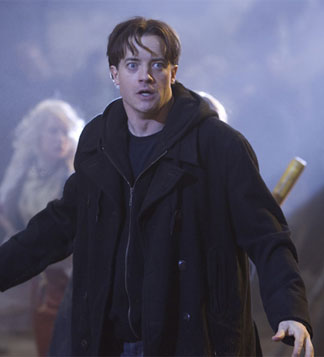 BRENDAN FRASER: When I did Gods and Monsters, everyone in town wanted me to go and do Terrence Malick's Thin Red Line. Including myself. It was Terrence Malick. A little-known director called Bill Condon had a sort of not-known-to-Hollywood theatre actor called Ian McKellan signed on to do a movie that was based on a book called Father of Frankenstein, about a forgotten film director, in a sort of quasi-bio-pic, about the creator of an iconic horror figure in cinema history. And that was Frankenstein's Creature. And I was sitting on the fence about whether or not to do it. I was. Because I'd been offered something in Thin Red Line. But then it turned out Terrence - well, let's just say he's forgetful. He didn't have a screenplay. He had a long tome, really, that I did read. I met him a couple of times. And he forgot that he'd met me and offered me something in this movie. It's just who he is. He's brilliant. Come on, the guy did Badlands, you know?
BRENDAN FRASER: When I did Gods and Monsters, everyone in town wanted me to go and do Terrence Malick's Thin Red Line. Including myself. It was Terrence Malick. A little-known director called Bill Condon had a sort of not-known-to-Hollywood theatre actor called Ian McKellan signed on to do a movie that was based on a book called Father of Frankenstein, about a forgotten film director, in a sort of quasi-bio-pic, about the creator of an iconic horror figure in cinema history. And that was Frankenstein's Creature. And I was sitting on the fence about whether or not to do it. I was. Because I'd been offered something in Thin Red Line. But then it turned out Terrence - well, let's just say he's forgetful. He didn't have a screenplay. He had a long tome, really, that I did read. I met him a couple of times. And he forgot that he'd met me and offered me something in this movie. It's just who he is. He's brilliant. Come on, the guy did Badlands, you know?And Bill wanted me to do Gods and Monsters. And it was like, which of the two brilliant things do I want to be? I idolized McKellan, because he was who I watched do Acting Shakespeare when it was on BBC, when it was taped into the library when I was in training in - when I was 19, 20. Okay? He's the guy who made iambic pentameter make sense to me, as if it was a conversation. You and I are having a talk. And things happened the way that they should. I mean, Malick didn't - I wound up not being in his film. And actually, it was Adrien's movie. And the first time Adrien showed up with his family at the first screening, he was cut out. And Jim was, like, the character in the whole movie. I mean, he'd shot so much footage, that he could cut it any way he wanted to. So, making movies is a little bit strange. It's a little bit of a crap shoot, you know? You never really know.
However, with the piece that Gods and Monsters presented me with was an opportunity to really wrap my arms around a role working alongside someone who is and was an inspiration to me. The reason why I felt like, "This is what I do. I've found what I love, and I must have courage, and I will go forward and do it." And he had brought little - never in a way that was condescending. You could see he cared about the craft. And I believe that he cares about the people he works with so much. I get Christmas cards from him, and phone calls, and stuff like that. He loves e-mail, by the way. He wants to pass along his knowledge. That's who he is. And he has a humility in him that's such that he does have a sense of brilliance about him. But he won't let himself come out and thump thump for himself.
What I wanted to say is, what I took from having had that experience, was that even the movie - if you're going to do this job, working in this way, you're very fortunate to be able to do that. Be grateful for that. And also, approach each day's work and each take as if it was the first time and the last time. You won't ever do it again. And that's damn good advice. Because as easily as you think you may have fallen into it, it can all end. But if you're doing it as if it's for the last time, it's captured, and will live forever.
QUESTION: I presume you still follow and take that advice today.
BRENDAN FRASER: Always. Absolutely. And it applies to other parts of my life, too. But the thing is, I firmly believe that you should be able to balance between the two. I mean, let's face it. There are mass - some easily digestible projects, like The Mummy. If Looney Tunes didn't die on arrival, there would be part two and three, okay? And nobody would have run for the hills as if their pants were on fire, and pointed their fingers at me. Frankly, it's Daffy Duck's fault, if you ask me. But. He turned down work. What can I say?
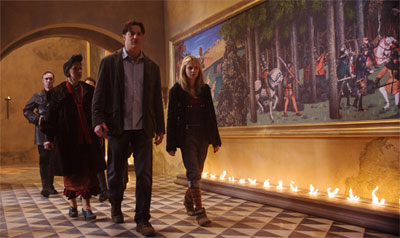 QUESTION: And then there's The Quiet American, and then there's Gods and Monsters.
QUESTION: And then there's The Quiet American, and then there's Gods and Monsters.BRENDAN FRASER: And then you can allow those other projects to have something to - maybe they might not hold up right at that moment. They might not be that popular. They might not elicit tears for what you're doing or saying at that time. And there's many films like that out there. Not just - I'm just speaking of the ones that I know of, because I've worked on them. But in time, they hold up. And to me, that's gratifying. From a sense that, I feel like it's important to entertain and, if you can do, along with the group, have something that maybe stays with its audience after they walk out the door, and maybe think about it a bit. Enlighten them, you know? Give them a sense of accomplishment, in terms of how we approach conflict resolution. Opening a dialogue about something. What a simple idea. Talk to each other. You know? I mean, that could be the messages, without rubbing anyone's nose in it.
QUESTION: Well, Inkheart has an element of both of those in it. At least Inkheart explores the power of the written word in a way that a lot of fantasy movies don't do as much of. I mean, this is a movie about literature.
BRENDAN FRASER: Right.
QUESTION: Which I think must be a very important facet of this movie.
BRENDAN FRASER: It's the celebration. It revels in it.
QUESTION: Do you want to put the fantasy cinematic world behind you for a bit, and try to go back to those -
BRENDAN FRASER: Look. I've come of age in a period of filmmaking, historically, where we went from - I'm not saying, like, the horse and carriage, to the model-T. But you can see the dotted lines and the homework around CGI effects, back in the early '90s. And you forgave them. Or if they had really good ones, that was the reason to go. Like, "Wow, you won't believe it." And now, par for the course. Every film has some sort of treatment to it digitally, to correct an environment. In Crash, at the end, it snowed in Los Angeles. All the characters are going - it's cold right? At the end of the film, it cranes, it booms, up, and there's snow coming down. There's no snow, they put it in digitally. However, the point being, once the level of any screenwriter having enough imagination to put together their thoughts and ideas, and if it's an original one or an adaptation, if you will - you know, look at Benjamin Button. I mean, that's - six years ago, unimaginable. There's no way they could have pulled that off properly. You'd have people going, "Eh." But now you can. You can. And you just don't notice it. If you can think it, you can put it on the screen. It's really gotten good that way. But with it comes responsibility. You've got to get back to just the basics of telling a story. You can't rely on, "Oh, cool, it's in 3D." You've got to care about the people in the movie. Otherwise you're watching a pyrotechnics display. Hey, look. I like fireworks just as much as the next guy. But after, like, ten, 15 minutes, you're like, "Okay, where are the car keys? It's getting dark." You know what I mean? So, if fantasy equates with the sort of CGI - not necessarily high-budget movies, because it's become less and less expensive to create these effects. That's an area that I'm comfortable with, because I've come of age in filmmaking, and I've learned a trade, really.
QUESTION: Do you want to direct?
BRENDAN FRASER: I'd rather produce than direct, for now. Yeah. Like, I believe there are proper directors. I'm an actor. And that's what I do. I know how to act. I've seen directors. I've worked with first-time writer-directors. I won't do that any more. But it's just because by virtue of the fact I'd had more trigger-time than they had, that I just - I just know you're not gonna get your day, dude. I just know that. You're shooting the wrong way. I'm sorry. You've got to - look. You've got an hour and a half, you're gonna lose the light. I just know it, just because of experience. And directing comes either with gifts, talents, or trial and error, or good fortune. Or nepotism. Or whatever, I don't know. I'm gonna call it like it is. Okay? Let's get serious. And just because you have the ability to say, "I am an actor, but what I really want to do is direct"-just because I can doesn't necessarily mean I should. But I am comfortable having an opinion about something, from everything that I've gleaned along the way. And that comes in terms of being more of a creative producer. That's what I can do. And then when it comes down to talking to the studio, and the people who are so essential to the process, the front office. You can go to them and go, "Look." You know, they have to take you seriously, because you've got the stripe. All right? And they can't just regard you as, "Oh, look. They're talking props. Oh." You know. It doesn't apply any more.
QUESTION: So what are you going to do next?
BRENDAN FRASER: I don't have an answer. I don't know. Right now, I think I'm gonna take time with my kids, because Inkheart's winding down. The industry's in kind of a stumbling block at the moment, what with - my fellow - the actors union. If we will get our act together, and see if we can find - take a step towards conflict resolution.
QUESTION: Do you think you guys will strike?
BRENDAN FRASER: Don't ask me that question. [LAUGHTER] I pass on answering it.
QUESTION: I can't imagine that they would want to do it again after the writer's.
BRENDAN FRASER: Come on. I don't think - forget acting and stuff. We have other things at hand right now, to attend to. January 20th is not coming in soon enough.
QUESTION: Are you attending the Inauguration?
BRENDAN FRASER: I was invited, but it's just - logistically, it won't make sense. I'm doing press for all of these - .
QUESTION: Do you think you've left Mummy behind? Is that sort of the end of that franchise?
BRENDAN FRASER: I'll miss that character. Maybe Rick can go to be reincarnated into something else. But I really enjoyed playing that character. And if not, some version of it. That's what I'll say. I'm not done with that guy. I had a great - come on. That was great. That was just flat-out fun. Don't tell anybody, but I really enjoyed it. I had a great, great time. Big toys to play with. And on top of that, it's a crowd-pleaser. It never pretended to be anything it ever wasn't. It was a straight-ahead entertainment. You don't like it, then go watch something else, okay? Go sneak into Men in Black II, or whatever it is that's playing at the theatre next door. We never took it seriously. The first one, I remember Rachel was panicked. "Oh my God. They're going to confiscate our Screen Actors Guild cards." No, "Our Equity cards." Here, I'm doing bad impressions. [LAUGHTER]
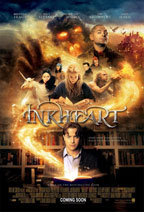
Inkheart
Starring: Brendan Fraser, Helen Mirren, Jim BroadbentGenre: Science-Fiction/Fantasy
Runtime: 1 min 46 secs
Cornelia Funkes best-selling novel, INKHEART, comes to life in director Iain Softleys (THE SKELETON KEY, THE WINGS OF THE DOVE) feature-film adaptation of the same name. For 12 years, bookbinder... Cornelia Funkes best-selling novel, INKHEART, comes to life in director Iain Softleys (THE SKELETON KEY, THE WINGS OF THE DOVE) feature-film adaptation of the same name. For 12 years, bookbinder Mo (Brendan Fraser) and his daughter, Meggie (Eliza Hope Bennett), have been traveling the world, poking around secondhand bookstores. Meggie correctly assumes that her father is looking for her mother, Resa (Sienna Guillory), who disappeared without a trace.
What Meggie doesnt know is that Mo is a Silvertongue, and when he reads a story aloud, the details and characters come to vivid life. But when a character comes out of a book, someone has to go back in, and Mo is searching a copy of the book, titled "Inkheart," into which Resa literally disappeared. When Mo read the story aloud, unaware of his powers, she was sucked into the story, and the fantastical novels villainous characters were released. Now, Mo and Meggie have to keep evil Capricorn and his henchmen from realizing their diabolical plot, and send everyone back where they belong.
INKHEART is awash with colorful details. Capricorn has had to make do with a stuttering Silvertongue who delivers characters that are half-read: text from the book is tattooed on their faces, or they suffer some other malady, emerging from the book mute or with an odd physical feature. Paul Bettany is engaging as Dustfinger, a character who desperately wants to be read back into "Inkheart" and return to his family, portrayed by Bettanys real-life love, Jennifer Connelly, in a miss-her-if-you-blink performance. Helen Mirren is good fun as eccentric, feisty bibliophile Aunt Elinor, and Jim Broadbent appears as the novels author, who is enthralled by the possibilities of Mos gift.
MORE
- Viggo Mortensen The Road
- 24 Cast Reunion
- Aaron Eckhardt No Reservations
- Aaron Eckhart The Dark Knight
- Adam McKay Step Brothers Interview
- Alan Alda Diminished Capacity Interview
- Alan Alda Diminished Capacity Interview
- Alex Dimitriades
- Al Pacino Oceans 13
- Alan Rickman Snow Cake
- Alan Rickman Sweeney Todd



